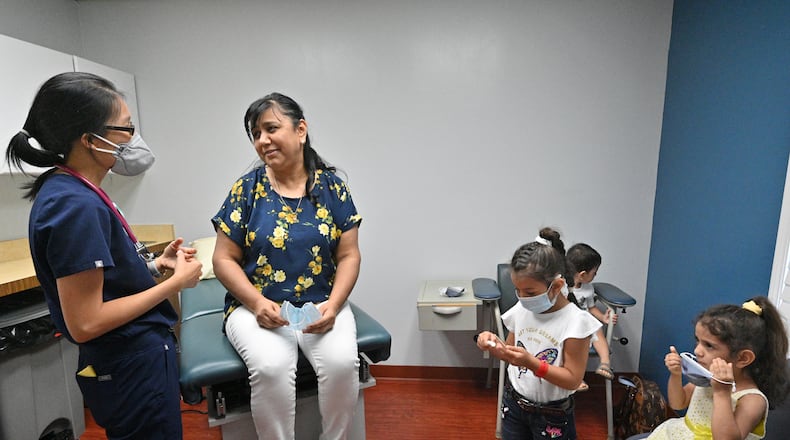Since the nonprofit clinic Ethne Health opened its doors in Clarkston roughly five years ago, many of the refugee patients that sought care have come in with a similar issue: oral health problems.
With no dentistry expertise or equipment on hand, primary care physicians could treat the symptoms of a disease – like prescribing an antibiotic for an abscess – but not do much else. That will change this week, when Ethne will inaugurate its own dental clinic, also targeted to un- and underinsured people in one of Atlanta’s most diverse neighborhoods.
The dental clinic will address a need that has long gone unfilled in the refugee haven of Clarkston.
As newcomers with limited means, refugees have difficulty purchasing medical insurance that covers dental care – or paying for services outright. In addition, transportation and language barriers frequently combine to complicate access to care.
“Here in Clarkston, every refugee needs help with dentist, absolutely,” said Shakhzada Baina Zarova, a refugee from Kyrgyzstan, in an interview with The Atlanta Journal-Constitution.
A Georgia State University Prevention Research Center (PRC) study captures the scale of the need.
After interviewing 36 members of different ethnic backgrounds from the refugee and immigrant communities in Clarkston, researchers found that 3 out of 10 people had not seen the dentist in at least three years. According to the September 2022 study, since their arrival in the country, 8 out of 10 people had seen the dentist only to address a dental problem, not for preventative care. Of those who went to the dentist, 7 out of 10 did not have a complete treatment because of the cost, and 9 out of 10 people reported that nobody spoke their language at the dental office.
“When we think about just how important oral health is, that it’s important for eating and talking and social expression, and it’s also related to issues around heart disease and respiratory infections, it just, it really moved us to adapt and to meet this need,” said Dr. Robert Contino founding team member of Ethne and CEO.
Ethne Dental will initially be open on Tuesdays from 9 a.m. to 4 p.m. and every other week on Wednesdays from 9 a.m. to 12 p.m., before expanding their hours over time.
Eunice Chay, Ethne’s dental director, says the first patients prioritized will be those who have faced the steepest barriers to receiving care.
Upon settling in Georgia, refugees are given Medicaid coverage through the state’s Refugee Health Program. But that coverage lapses after eight months, and before that it can be difficult for newcomers to find providers that will take their insurance and arrange transportation to make it to an eventual appointment.
“I see it being in the beginning a lot of disease management. A lot of emergency visits, people who have been in pain, who’ve had abscesses, who have tooth aches and fractured teeth and need acute care, especially adults who are uninsured,” she said. “We want to make sure we’re prioritizing patients who would not get care otherwise.”
Children won’t be seen at the beginning – unlike adults, they are more likely to have insurance that includes dental services – but Chay says Ethne hopes to eventually be able to provide comprehensive care for the entire family. As is the case in the medical clinic, the dental clinic will rely on trained interpreters so language isn’t an issue.
To ensure patients have no trouble finding the dental clinic, Ethne has occupied a space across the street from its medical clinic, located in the heart of Clarkston and within walking distance for many families.
Credit: HYOSUB SHIN / AJC
Credit: HYOSUB SHIN / AJC
Ethne leadership says more accessible dental care has the potential to markedly improve refugees’ quality of life as they adjust to new beginnings in Georgia.
“I think if you have access to care, and to seeing a dentist and getting preventative maintenance, you don’t have pain or, you know, you don’t have missing teeth. It’s something we take for granted. But for those who don’t have that luxury, it’s a daily struggle.”
The Atlanta Journal-Constitution and Report for America are partnering to add more journalists to cover topics important to our community. Please help us fund this important work at ajc.com/give
About the Author
Keep Reading
The Latest
Featured


